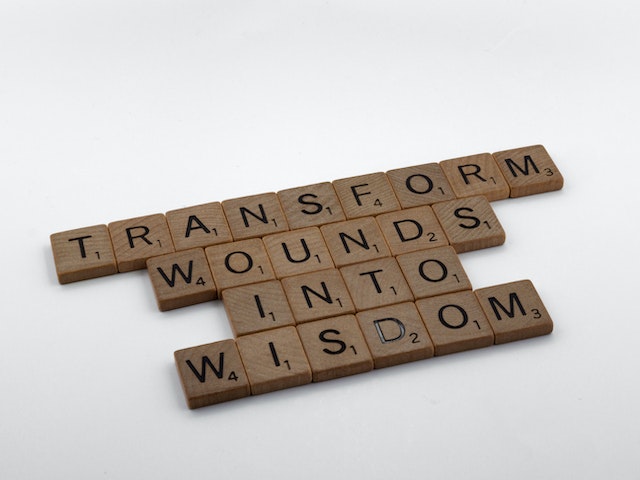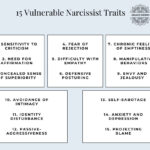Healing from Narcissistic Abuse: 20 Essential Tips for Recovery and Self-Empowerment

Healing from Narcissistic Abuse: 20 Essential Tips for Recovery and Self-Empowerment
Embarking on the journey of healing from narcissistic abuse can feel like navigating through a dense fog, where every direction seems uncertain.
You’re not alone in this. Countless individuals including myself have walked this path and have emerged stronger, healthier, and more resilient.
In this blog post, I provide you with 20 essential tips that can guide you through the healing process. But remember, sometimes we need more personalized support and structured guidance to have a complete narcissistic abuse syndrome recovery.
If you’re interested in healing from narcissistic abuse, I warmly welcome you to my Narcissistic Abuse Recovery Program. It’s an easy self-paced online course which you can do at your own pace. My signature program combines scientific and spiritual tools for holistic healing of the body, mind, and spirit.
20 Essential Tips for Recovering From Narcissistic Abuse
Before we delve into the 20 essential tips for healing from narcissistic abuse, I want to highlight that each journey is personal. These guidelines aim to empower and support your unique healing process.
1. Acknowledge the Abuse:
Acknowledging and validating your experience is the first step in healing from narcissistic abuse. At this stage, you might be struggling with cognitive dissonance due to the narcissist gaslighting and manipulation tactics.
Recognizing that you’ve been subjected to narcissistic abuse is often the most challenging, yet crucial step in the healing process. This step involves coming to terms with the harsh reality that you’ve been a victim.
It’s not about self-blame, but about understanding that the maltreatment you endured wasn’t your fault. Admitting the truth might be painful initially, but it opens up the path to healing, liberation, and a brighter future.
2. Learn About Narcissistic Abuse :
Knowledge is power when it comes to healing from a narcissistic relationship. By educating yourself about its dynamics, you can better understand what happened and why.
This understanding is a potent tool in your narc abuse recovery. It can help demystify your experiences, eliminate self-doubt, and affirm your reality, making you feel less isolated. Read articles, books, or listen to podcasts on the subject.
Related: 12 Traits of a Narcissist
3. Self-Care and Self-Discovery:
Prioritizing self-care and self-discovery is crucial when healing from narcissistic abuse. After such an ordeal, it’s easy to lose sight of who you are as you’ve been molded into the image the narcissist manipulated you to be.
Now, it’s time to shift the focus back onto you. It’s about more than just recovering from a narcissistic relationship – it’s about becoming who you were meant to become and THRIVING.
Delve deep into understanding yourself, your likes and dislikes, your dreams, and your potential. Experiment with new hobbies, reconnect with old ones, and give yourself the permission to enjoy life on your terms.
Activities such as reading a book, walking in nature, or practicing yin yoga not only promote relaxation, they also offer opportunities for introspection and self-exploration.
Journaling your thoughts, feelings, and discoveries can be particularly beneficial. All these activities are about rebuilding the relationship with yourself, a relationship that was undermined during the narcissistic abuse. This process helps unearth your authentic beauty and resilience.
Related: Self-Healing from Narcissistic Abuse
4. Establish Boundaries:
The process of healing from narcissistic abuse demands the establishment of healthy boundaries. Victims often struggle with boundary-setting and engage in people-pleasing tendencies.
Learning to set boundaries is about acknowledging your rights and respecting your personal space.
It’s an essential skill to protect your wellbeing and prevent future exploitation. This might require time and practice, but remember, every step towards enforcing boundaries is a step towards empowerment.
Repeating positive affirmations to yourself is helpful to train yourself to start honoring your needs. Check out the following codependency affirmations which can help you break free from people-pleasing tendencies as you rewire your brain through conscious neuroplasticity.
Related: Setting Boundaries with a Narcissist
5: Limit Contact:
Reducing or eliminating contact with the narcissist can greatly accelerate the healing narcissistic abuse. The narcissist’s presence, even digitally, can provoke stress and hinder your recovery.
By cutting ties, you’re minimizing their influence over your emotions and creating a safer space for healing.
In cases where complete avoidance isn’t possible, consider creating strict rules for engagement to limit the potential for further abuse and manipulation.
Related: How to Deal with a Narcissist
6. Grieve:
Breaking up with someone is always painful and difficult. Yet when ending a relationship with a narcissist, individuals go through something completely different. They find themselves going through a grieving process. This step is vital for narcissistic abuse healing.
You’re not just mourning the loss of a relationship, but the illusion of the persona the narcissist fabricated to lure you. In reality, you’re grieving the fake prince charming or knight in shining armor that turned out to be just an illusion.
The realization that the person you loved didn’t truly exist can be extremely painful. It’s okay to feel sad, angry, and betrayed. All these emotions are part of the grieving process.
Acknowledging and processing these feelings is crucial as it helps you move past the pain, accept reality, and pave the way for healing from narc abuse and new beginnings.
Related: Divorcing a Narcissist
7. Physical Health:
Maintaining your physical health is a powerful tool in the narcissistic abuse recovery journey. Regular exercise does more than just improving your mood and sleep, reducing anxiety, and boosting self-esteem.
Movement helps release trapped emotions from your body. It encourages a positive outlook by raising your vibration and stimulating your brain to release endorphins, the feel-good hormones.
Adopting a balanced diet is equally crucial. Nourishing your body with wholesome food provides the strength needed to combat stress and fatigue. Notice how sluggish and drained you feel after consuming a heavy, unhealthy meal like junk food, compared to the vitality and mental clarity experienced after a nutritious, balanced meal.
Prioritizing sleep cannot be overstated, as it’s a fundamental period for your body and mind to recover and regenerate. Quality sleep restores your energy levels, boosts your mood, and sharpens your cognitive abilities.
Together, regular exercise, a balanced diet, and adequate sleep create a trifecta of self-care, contributing to resilience against the emotional toll of narcissistic abuse.
Related: Weird Things Covert Narcissists Do
8. Journaling:
Writing about your thoughts and feelings is a therapeutic way to process your emotions. It allows you to clarify your thoughts, recognize patterns, and track your progress.
Journaling can be a safe space for expressing your deepest fears, angers, or sorrows without judgment or repercussions.
Seeing your feelings on paper can bring catharsis and a new perspective, helping you make sense of your experience and charting your path to recovery from narcissistic abuse.
9. Mindfulness:
Practicing mindfulness techniques like meditation is a valuable skill for staying grounded in the present. In the aftermath of narcissistic abuse, it’s common to get stuck in painful past memories or worry about the future.
Mindfulness encourages you to engage with the present moment, accepting your thoughts and feelings without judgment.
This focus on the ‘here and now’ can bring calmness, reduce anxiety, and help you regain control of your mental space.
Related: How Does a Narcissist React When They Can’t Control You?
10. Self-Compassion:
Healing from a narcissist requires a great deal of self-compassion and kindness to yourself. It’s crucial to acknowledge the pain you’ve gone through without judgment or self-blame.
You’ve endured a challenging situation, and it’s okay to grieve, to be angry, or to feel lost. Remember, it’s not a sign of weakness, but a testament to your strength.
Practice talking to yourself as you would to a dear friend, with patience, understanding, and love.
11. Forgiveness:
Forgiveness in the context of healing from narcissistic abuse doesn’t mean condoning the actions of the abuser or forgetting what happened. Instead, it represents a profound act of self-love, liberating yourself from the burden of resentment and the exhausting cycle of reliving past harms.
Holding onto anger, even though it might seem justified, ultimately only hurts you and hinders your progress. Forgiveness is not about benefiting the narcissist; it’s about finding inner peace and liberating yourself from the chains of the past. This is a personal journey that may take time, but each step taken is a stride towards healing after narcissistic abuse.
As you progress in your healing journey, another crucial aspect of forgiveness comes into play: forgiving yourself.
It’s common to harbor guilt or self-blame for staying in an abusive relationship. However, understand that you remained because you were wounded and needed to heal fragmented aspects of yourself.
The experience, while painful, presented an opportunity to learn vital skills, such as setting boundaries, recognizing manipulation, and fostering healthier relationships with yourself and others.
Let go of self-judgment and realize that you did the best you could with the knowledge and resources you had at the time. Self-forgiveness is a monumental step in restoring your self-esteem and paving the way for lasting recovery from narcissistic abuse.
Related: Guided meditation for healing from narcissistic abuse
12. Reclaim Your Identity:
It’s common for victims of covert narcissist mothers and partners to lose touch with their unique identities as they are overshadowed by the manipulative tactics of the narcissist.
Now is the time to reconnect with your interests, passions, and goals that were pushed aside during the abuse.
Take time to reflect on what truly inspires you, what values you uphold, and what dreams you wish to pursue. Ask yourself what do you want out of life? This process will not only help you rediscover yourself but will also rebuild your self-esteem and independence.
13. Practice Assertiveness:
An essential part of overcoming narcissistic abuse is learning to communicate your needs and rights effectively without feeling guilty.
Narcissistic abuse often undermines your ability to assert yourself. Practicing assertiveness can help you find your voice again. It can teach you how to express your feelings, needs, and boundaries in a respectful yet firm manner.
This skill is critical not only in preventing future abuse but also in building healthier relationships moving forward.
Related: Why a Narcissist Won’t Divorce You
14. Self Expression:
Finding ways to express yourself is a key part of healing from a relationship with a narcissist. This can take many forms, one of which is art therapy.
Art, whether it’s through painting, making music, or any other creative outlet you prefer, can serve as a powerful tool to articulate feelings that may be difficult to put into words.
It provides a non-judgmental platform to explore and process your experiences, often leading to emotional release and a better understanding of your feelings.
Self-expression can also be channeled through other means like writing, dance, singing, creating music, or even cooking.
The key is to find a medium that feels authentic to you and gives voice to your inner self. It’s about reclaiming your narrative and transforming your pain into a source of strength and resilience.
15. Facing Fears:
You might be wondering, how is facing your fears related to narcissistic recovery? Facing your fears can indeed be a transformative experience. The abuse may have left you with deep-seated anxieties and fears that can hold you back.
Gradually exposing yourself to situations you’ve come to fear as a result of the abuse can help you regain confidence and dismantle these fears.
This doesn’t mean rushing into overwhelming scenarios; instead, it’s about taking small, manageable steps to reclaim your strength and trust in your abilities.
With each fear confronted, you’ll find yourself one step closer to a life free from the shadow of abuse.
Related: Things Covert Narcissists Say
16. Reframing Thoughts:
A major component of healing after a narcissistic relationship is learning to reframe the negative thought patterns that resulted from the abuse.
With the help of a trained therapist or life coach, you can challenge these damaging beliefs, replacing them with healthier, more accurate perspectives.
This cognitive restructuring can drastically improve your self-perception and help you regain control over your thoughts and emotions.
17. Trauma-Focused Therapy:
To heal the deep-rooted wounds caused by narcissistic abuse, consider seeking trauma-informed therapies. Methods such as Eye Movement Desensitization and Reprocessing (EMDR) or Somatic Experiencing offer therapeutic approaches specifically designed to address trauma.
These therapies can help you process and release traumatic memories, reducing their emotional intensity and the power they hold over you.
Alongside these therapeutic approaches, certain spiritual practices can provide a complementary path to release trapped emotions. Specifically, modalities like Yin Yoga and Tai Chi have been recognized for their potential to heal trauma.
Yin Yoga, with its focus on holding poses for extended periods, allows deep tissues to relax and release stored emotions. Tai Chi, on the other hand, through its gentle and meditative movements, can enhance emotional stability and resilience.
However, it’s important to remember that the path to heal from narcissistic abuse is very personal, and what works best for one person might not work for another. It’s also essential to work with trained professionals who understand the complexity and nuances of narcissistic abuse when considering any therapeutic approach.
Related: Signs You’re Healing From Narcissistic Abuse
18. Embrace Independence:
Embrace the journey of rediscovering your individuality and creating a fulfilling life away from the narcissist. This process involves asserting your independence, setting personal goals, and making decisions based on your needs and desires.
It’s about recognizing your inherent worth, and understanding that you don’t need validation from others to live a satisfying, self-directed life.
As you embrace your independence, you’ll find yourself growing stronger and more confident, capable of establishing a life that reflects your authentic self.
19. Support Network:
During a narcissistic relationship, it’s common for victims to experience isolation as the abuser often tries to cut off their connections to other people. This can make the journey to recovery feel even more challenging.
However, remember that you’re not alone. Surround yourself with supportive friends and family who understand your situation. It’s crucial to reconnect with those who affirm your experiences, validate your feelings, and offer compassion.
If you find yourself without a close circle of friends or family, don’t worry, there are still plenty of ways to build your support network. Start socializing by joining organizations or participating in activities in a social setting that you enjoy.
Whether it’s a book club, a yoga class, a local hobby group, or an online support forum, these can all serve as excellent opportunities to connect with others, make new friends, and foster a sense of belonging. Remember, the goal is to surround yourself with positive influences who respect and value you.
Their support can provide strength and perspective during your healing journey, offering a reminder that you are cherished and respected outside of the abusive relationship.
20. Therapy and Professional Support:
Seeking professional help can be incredibly beneficial. Therapists and experienced coaches, specializing in several forms of narcissistic abuse therapy, can provide valuable insights, coping strategies, and a safe space to express your feelings. They can guide you through different therapeutic approaches that suit your individual needs, offering tailored strategies to help you recover.
If you’re ready to take a step to start healing from narcissistic abuse, consider joining my NPD abuse recovery healing program. I’m here to provide guidance, understanding, and the tools necessary for your path towards healing and self-discovery.
My Related Services:
–Narcissistic Abuse Recovery Program: Join a structured program that provides tools, resources, and guidance to help you navigate and heal from the impact of narcissistic abuse.
–Email Advice: Get guidance, insights, and support directly to your inbox.
FAQs
Here are 10 out of 20 essential tips on healing from narcissistic abuse discussed in this article:
1. Acknowledge the Abuse
2. Learn about NPD
3. Self-Care & Self-Discovery
4. Grieving
5. Establishing Boundaries
6. Limit Contact
7. Journaling
8. Mindfulness.
9. Narcissistic Abuse Therapy
10. Reframing Thoughts
The recovery time varies greatly from person to person, depending on factors such as the length and intensity of the abuse, personal resilience, and the support available. It’s a deeply personal journey and there’s no set timeline. It’s essential to be patient and compassionate with yourself through the process.
Yes, it’s absolutely possible to fully recover from narcissistic abuse. It requires time, effort, and often professional support, but many people successfully move past the trauma and lead fulfilling lives. It’s about healing the wounds, learning from the experience, and cultivating healthier relationships moving forward.
Mental recovery involves acknowledging the abuse, educating oneself about narcissism, setting boundaries, and practicing self-care. Therapy, particularly trauma-informed approaches, can be beneficial. Building a support network and engaging in activities that help express emotions can also aid mental recovery.
Yes, your brain can heal after narcissistic abuse. With time, therapy, and self-care, your brain can recover and rewire from the traumatic experience. Trauma can alter brain functioning, but the brain’s plasticity allows it to repair and adapt, leading to recovery and resilience over time.
Additional Resources:
Narcissist Red Flags
Narcissist and Empath
Do Narcissists Cry?
Narcissist Checklist






